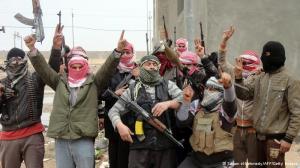The pundits are churning out words like geopolitics, sectarianism, mission failure, and strategic expansionism regarding the current dynamics and jihadist gains in Iraq and in some parts of Syria. But, there is an underlying concept that serves as the driving engine for jihadism in the 21st century, and it is as old as Islam itself.
That concept is martyrdom, and intrinsically linked to it is the concept of jihad, two sides of the same coin. Although these are not new concepts in Islam, they have morphed over the last few decades. They now encompass the act that is prohibited in Islamic law, suicide, as well as the chillingly subjective tool of takfir, that is, rendering someone a “non-believer,” and hence allowing him or her to be fair game as a target for jihadists.
These are the concepts that are fueling jihadism today, and when we peel back the layers of the Sunni-Shia rivalry and geopolitical ambitions on all sides, the core concepts of martyrdom and jihad function as the meat on the bones of jihadist ideology. Martyrdom and jihad were useful tools in the fight against the Soviets in Afghanistan. However, armchair militant clerics are continuing to exploit these concepts for their own political, ideological, and strategic agendas.
Normally, religious concepts are a façade for territorial and geopolitical goals. The real objectives are usually gaining territory, ruling over people, toppling regimes, and basking in the glory of power, wealth, and totalitarian control over others. In the case of the Islamic State of Iraq and Syria (ISIS), the tangible goals still exist, but its followers are feverishly driven by ideology, the primary engine of their violent vehicle. And now, with the sharpening of the Sunni-Shia face off, the religious potency of each side’s motivations only becomes more acute. This is not to say that they are not your basic thugs and gangsters; yes they are indeed. But, add to the mix their puritanical religious obstinacy and combine that with their fearless attitudes towards death because of the concept of martyrdom, and then we have a recipe for disaster unfolding before us.
Both Sunnis and Shias embrace the concept of martyrdom, albeit with some nuanced distinctions. For both, martyrdom is a ticket to heaven, that is, eternal residence in paradise. The definition of a martyr is also generally similar in both sects, but for Shias it is dramatically and emotionally manifested in the slaughter of Imam Hussein and his family in Karbala at the hands of the Sunni Caliph at the time, Yazid. If you think that these 7th century events are long forgotten, think again. Twitter and social media are abuzz with profile names and labels like “Mu’awiya,” the Umayyid Caliph and father of Yazid, and invocations of Ali and Hussein.
Given that the new wave of conflict in Iraq is intensely along sectarian fault lines, the symbolism of Karbala only magnifies itself. For would-be jihadists and martyrs on both sides, religious history never dies. It only continues in ensuing chapters. We are witnessing the next major chapter in the Karbala legacy. Now that Iraq’s prominent Shia Ayatollah Sistani has made a call to arms to fight against the ISIS/Sunni onslaught, the new Karbala chapter is certainly about to be written.
Another dimension of these recent developments is that the ISIS incursion into Iraq is resurrecting the Iran-Iraq War “chapter two,” with the difference this time being that Iran will be fighting against primarily non-state actors in Iraq, with all of her state military assets along with her own non-state assets as well, and whereas in the first Iran-Iraq War the sectarian identities of Sunnis and Shias did not play a significant role – this was a major miscalculation by Ayatollah Khomeini. This time, sectarianism will be the primary reason and calculus for the bloody conflict ahead. Don’t forget that the first Iran-Iraq War lasted eight years. To refresh your memory, here is a description of the Iran-Iraq War, courtesy of Juan Cole in an article for Moyers & Company:
“From September of 1980, when Saddam Hussein’s Iraqi army invaded Iran’s oil-rich Khuzistan Province, until summer 1988 when Ayatollah Khomeini finally accepted an armistice, Iran and Iraq fought one of the Middle East’s longest and bloodiest wars. Its trench warfare and hidden naval encounters recalled the horrors of World War I, as did the Iraqi Baath government’s deployment of mustard gas against Iranian soldiers at the front and sarin gas against Kurdish civilians suspected of pro-Iranian sentiments.”
This second conflict is likely to match or surpass that, with varying degrees of intensity. Also, just like the first Iran-Iraq War, this one will also have powerful regional proxies backing their respective militias and armies. Some analysts are speculating that the venomous and violent nature of ISIS will oddly put Iran and the United States on the same side of this particular conflict. But in general, as in the case of the Syrian civil war, Iraq’s next conflict will be yet another Saudi-Iran face off vis-à-vis proxies.
ISIS has been disowned by Al Qaeda and other extremist jihadist groups fighting in Syria, because the former is considered too extreme even for them. Moreover, there is no doubt about ISIS’s anti-Western, anti-American, and anti-Jewish and anti-Christian sentiments. That has been made crystal clear with its actions and abuses against Syrian Christians; and, like all extremist groups, their first targets always are women. Iraqis are right to be terrified. Those Iraqi and other Sunnis who are celebrating the ISIS gains are delusional. All you have to do is see what is happening in Pakistan with the Taliban wreaking havoc against their own supporters. These are rabid dogs that bite the hands that feed them.
It is impossible to argue against a deep belief in martyrdom, jihad, and salvation in paradise. Yet, that is exactly what must be done. The failure to win the ideological battle only yields more bloodshed and intolerance.
No amount of airstrikes, bombings, intelligence, and counter-terrorism strategies will be completely successful without taking on the core ideology that drives individuals to jihad and martyrdom. Both Sunnis and Shias adhere to this ideology, hence the challenge is ever greater.
Ultimately, this will become a national security threat to the United States and European allies. The “foreign fighters” who constitute the volunteer jihadist fighters include many westerners among them. Many countries in the Middle East, Europe and the western hemisphere are worried about these fighters returning home, and then turning their guns and lethal expertise against their own governments and citizens. Since the contexts of jihad and martyrdom are increasingly translated in very nebulous ways, the ideology poses a dangerous threat to everyone.
Hayat Alvi, Ph.D., is an Associate Professor at the US Naval War College.
The views expressed are personal.




